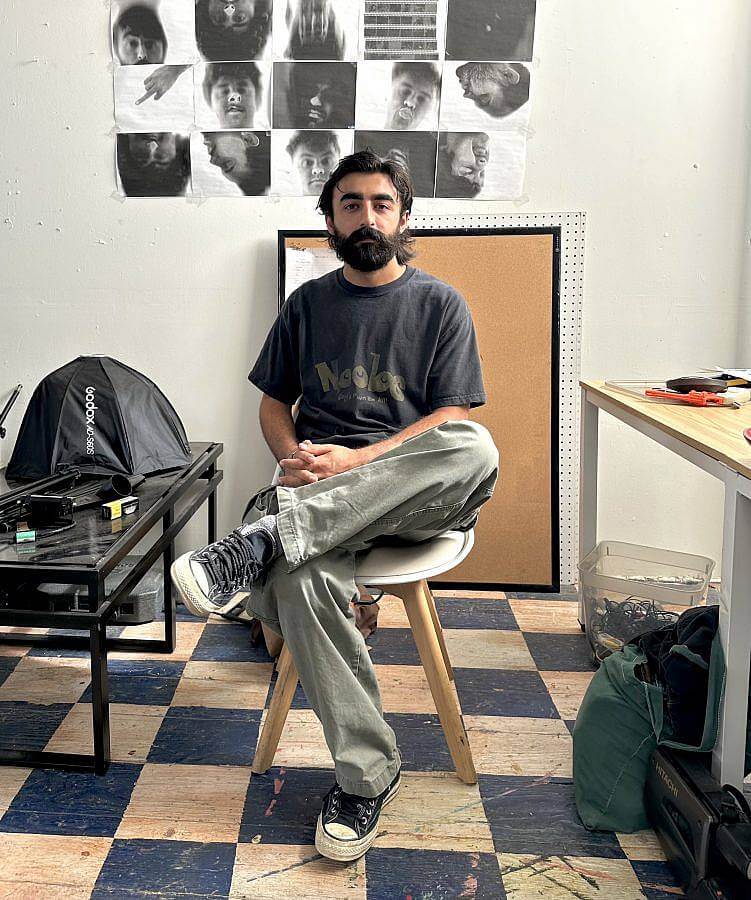Can you tell us a little bit about your space, safariiiCAMP, and the events and programming that you host?
The space we share is a two-story warehouse in Oakland, CA. Shared among 30 artists from all around the Bay Area. We host events that excite us, and hopefully that translates to the community. Kinda like “be the change you want to see”. We look for artists who are in tune with their community and culture, and then we try to echo their voices through our platforms, events being one of them.
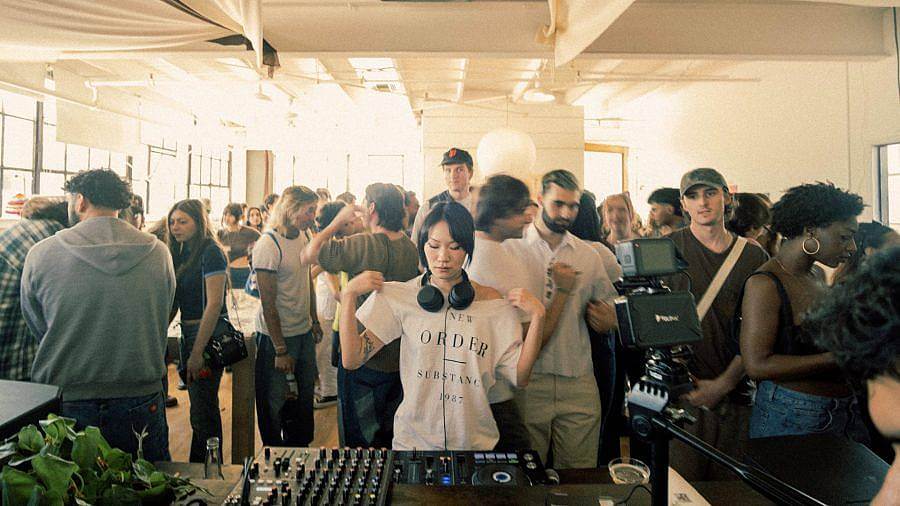
What led to the birth of safariiiCAMP?
As a photographer, I look for the next best story. Trying to meet everyone and see everything, spreading myself out led to a realization. Right now, our journey of self-expression (making art) feels commercialized and individualistic. We live in a society that heavily lacks third spaces and has a designed civilization that influences the separation we feel from our community. That being the context, I was in a full-time job, living in San Francisco. All my time was being used by work or the exhaustion from it. I had to do something, no time? and no art? I wasn’t going to let myself do that. I thought, with all these technical skills I’m learning and the amount of money I make, I could open an artist’s workspace starting with the people I know. Then, we could begin working on a solution to these problems.
How did you find the space that safariiiCAMP currently resides in, and what did you learn from previous spaces that it has inhabited?
We first started with a 1,000 sqft loft, just eight of us. The people who believed in the idea before the location even existed. The problem and solution presented to these artists were felt. After about 6 months of building out the space and hosting about 10 events in that time; we were kicked out. For context, a lady who lived right next door to us was filing noise complaints. We kept it pushing, this meant the world to us. Eventually, we were asked to leave. For 30 days, we looked for a new location. A member of our community connected us with real estate agents who were looking to flip their warehouses into a large artist’s hub.
After a conversation, we had agreed on a warehouse of theirs and were told we’d start with a 3-month contract. We chose to do our own thing, considering their plans were to build out cubicles that were rentable. That didn’t sit right with me. One of the main benefits I find at safariiiCAMP is how easy it can feel to connect with a resident and learn how to use their equipment. This allows us to freely become multi-faceted artists who can learn numerous things from each other. After moving in, cleaning the warehouse, fixing it all up, we were told we had to leave AGAIN. We weren’t given much of a reason. It had only been 30 days. After the founder of Good Mother Studio, Assan Jethmal, vouched for us and tried to see what we could do, we were told by the landlords that it still wouldn’t work out.
With the pressure to not let everything go to waste, we were in a rush to find a new location. 30 days go by, and after a collective decision, we agree to not rush on signing a lease. We move everything into a storage room and continue our search. Finally, we found a larger warehouse. It’s beautiful, large windows, two stories, but almost double our budget. We really had to think about it. After going back and forth, and more than doubling our residents, we agreed we had to take the risk. If we didn’t commit, we wouldn’t have known what would come out of all of this. Now, here we are in Oakland, CA in a warehouse near Lake Merritt and Laney College.
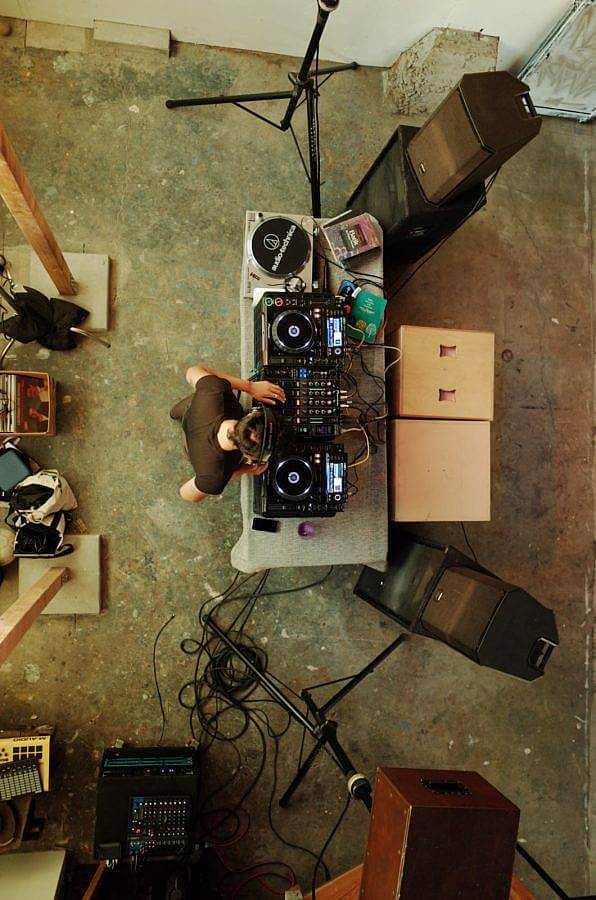
What is one of the bigger challenges that safariiiCAMP or other spaces in the Bay Area have faced, and how do you see it developing?
I think physical space is a big challenge, a place where we can come together, learn and express ourselves. We already find that a big struggle with a lack of third spaces in the US and we feel that here. I think something most artists have to struggle with in order to understand themselves better is the balance between making it for yourself whilst also yearning for recognition. Then there is the ego, something we all struggle with. Having a place to be yourself, to have the room to make mistakes, to surround yourself with people who make the room to help you learn from them and have those conversations is very important to us. I tell people, you come into this studio and make whatever you want, but I find one of the most important benefits is having conversations after a long day. We all struggle with a lack of creativity, confidence, maybe resources, and through a conversation with residents at the studio, we are able to support each other through those moments. We’re on a journey of self-expression. We express, learn, and continue. That’s where the name of safariiiCAMP came from, safari in Arabic and Swahili meaning ‘to travel’ and camp being a place where people reside on their journey. This CAMP (or studio) is a place that hosts a part of your journey of self-expression.
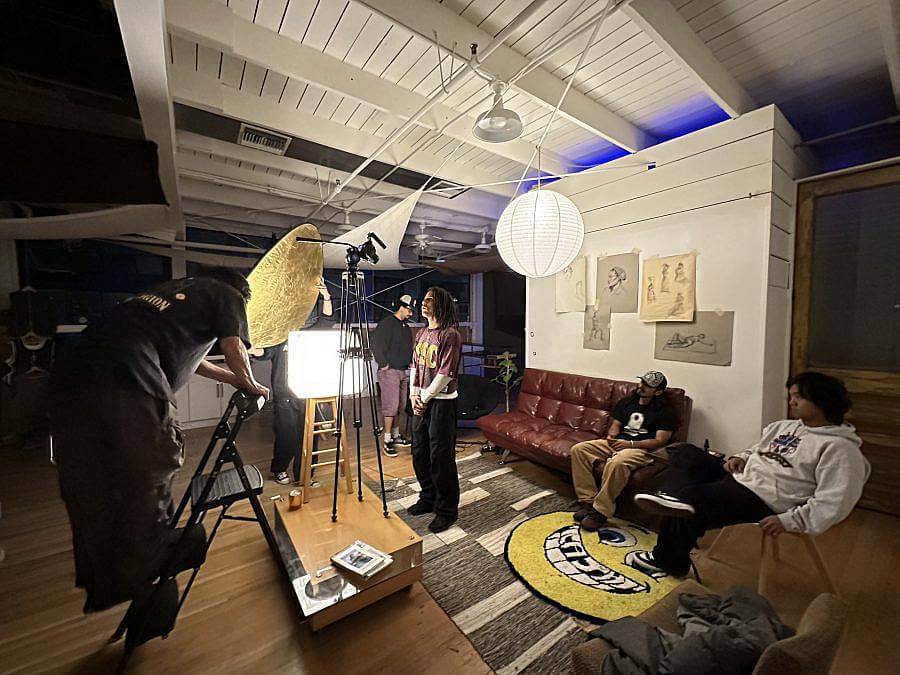
What makes a good collaborator, in your experience? How does an effective team function?
I think initiative. With projects, there can be so many things to do. Initiative is important when getting things done. Mainly, I think the ability to understand the goal of the project and lend yourself to achieving the best outcome. This is crucial because a team needs your creative ideas but not the ego. It takes trial and error with ideas, feeling bad about your idea not being immediately championed is something that takes away from the objective and directs it towards yourself. Or maybe doing something that is something others don’t want to do. At the same time, we also support continuing to champion your own ideas, push for it, explain it, translate your thoughts to us and convince us that the idea lends itself to the objective of the project if we may not be seeing it. Doing those few things can lead to gaining the trust of a team. A team functions well when they trust each other, that opens the door for open communication and the space to be vulnerable in order to ask for help. That communication ensures the entire team has visibility on the project and allows for people to be flexible and support each other. It covers all the holes. Also having the perspective that it’s never going to be perfect, we’re not perfect but our appreciation for the process and each other is what’s most important.
Have there been any important lessons learned as safariiiCAMP has grown?
Easily, communication. Communication is needed almost at all times, especially when you find yourself holding feelings back, it’s crucial to communicate or forgive them. These problems in the big picture are natural, we have feelings, we come up with reasons why not to just tell them, it’s hard. Communication is crucial when you’re doing things as a collective, we all have lives and we can only imagine how hectic each person’s life is outside the studio but managing stress and excitement at the same time can look different for each person. We’ve learned that, and agreed that communicating helps us manage our expectations and feelings. I’ve personally learned that I can get too excited or put too much on my plate, which leads to me doing things without communicating and leaving my team in the dark. I’ll admit it, I’m not perfect. I’m grateful to have a team that can give me this feedback and give me the space to grow as well. I tell people that as they join- “this space will not be successful without open communication and your feedback”. Feedback and open communication are crucial to growth.
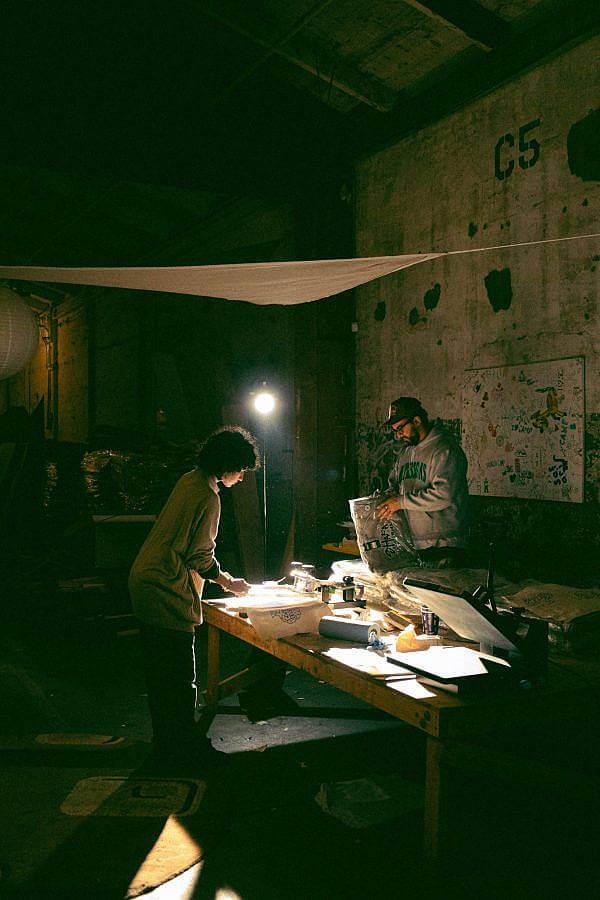
How do you manage decision-making among a large group of individuals?
Good question, this is something we are still struggling with but I think we’re getting to a solution. It used to be much easier to communicate with 8 people and make collective decisions. But to manage 30 artists is a whole new thing. We’ve received the feedback and the studio is working together to create committees, to avoid overload of work which leads to moving too fast and forgetting to communicate. This way there are more eyes on all of the work and it can be communicated. Because we have such special people around us, we have the room to grow and adapt to what we learn about ourselves. Hence why I feel comfortable sharing our struggles. We feel supported by each other and want to help people learn from the mistakes we make.
Has there been a particular event hosted by safariiiCAMP that has been regarded as a team favorite?
I think it’d be our first Recess event hosted in Golden Gate Park, it was our first outdoor and larger event that we had done. An overcast day, in the grass, with beautiful decorations, flea market-styled vendors and food for sale. The sun came out in the middle of the day and we were serenaded by a variety of musicians from indie rock to house.
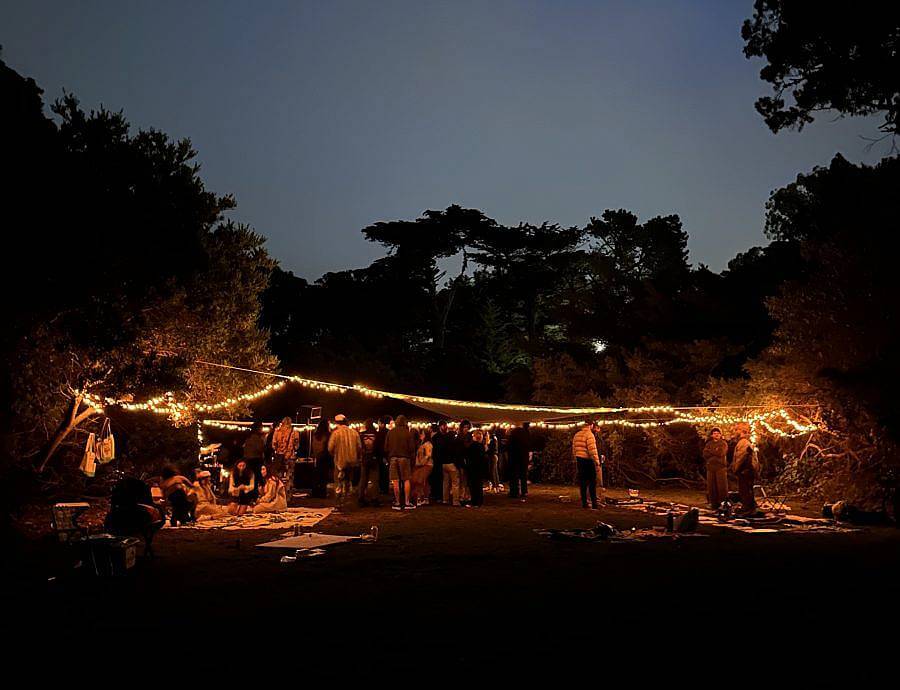
How does the power of community enable the ability to pull off larger projects?
The power of community has offered us so much of their time, interest, money and through word of mouth. To host an event AND have people show up? Boom. Hella power. All the people involved feel supported and grateful. Helps us feel ready to do the next thing and the next. Community supports each other through a common understanding, to help the person next to you, to help what you feel connected to or needs you. You support the community and they will support you.
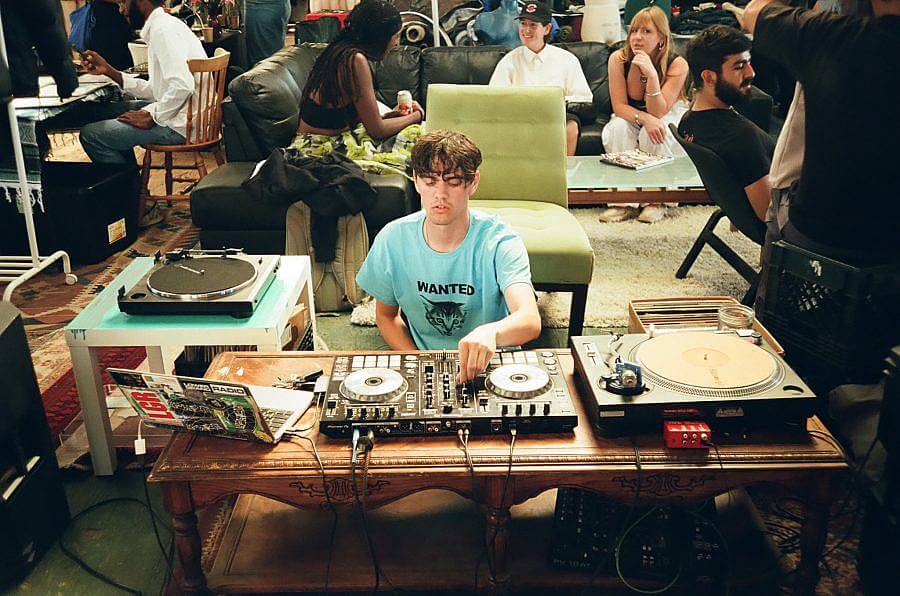
Are there any commonalities that unite the members of safariiiCAMP?
We all agree that this world feels fucked. We agree that to start working on the problem is to come together. We agree that art has the power to influence people. We agree that we can do it. Other than that I mean we all just spent the last decade with a device in our hands telling us about a world of art that we had to redefine for ourselves. That process led us to being inspired by so many other things outside of pop culture or US Politics, in fact, we can also agree on liking anything that goes against those two things. I know most people will agree with that, we’re not all that different from each other.
What is a typical day like at safariiiCAMP? How frequently are people on site? What do folks get up to when they are there?
Every day is different. But what happens frequently is that people come after work or school, and start chatting with each other and catching up about their days. Some people will grab some food or play video games to wind down. Then people will either continue a project they’ve been working on together or develop an idea or plan for a new project. If they don’t feel like doing anything, then they’ll usually talk about that and discuss what’s been holding them back. There’s a strong understanding for what comes with a human’s life and our emotions at the studio. There’s always space to be yourself.
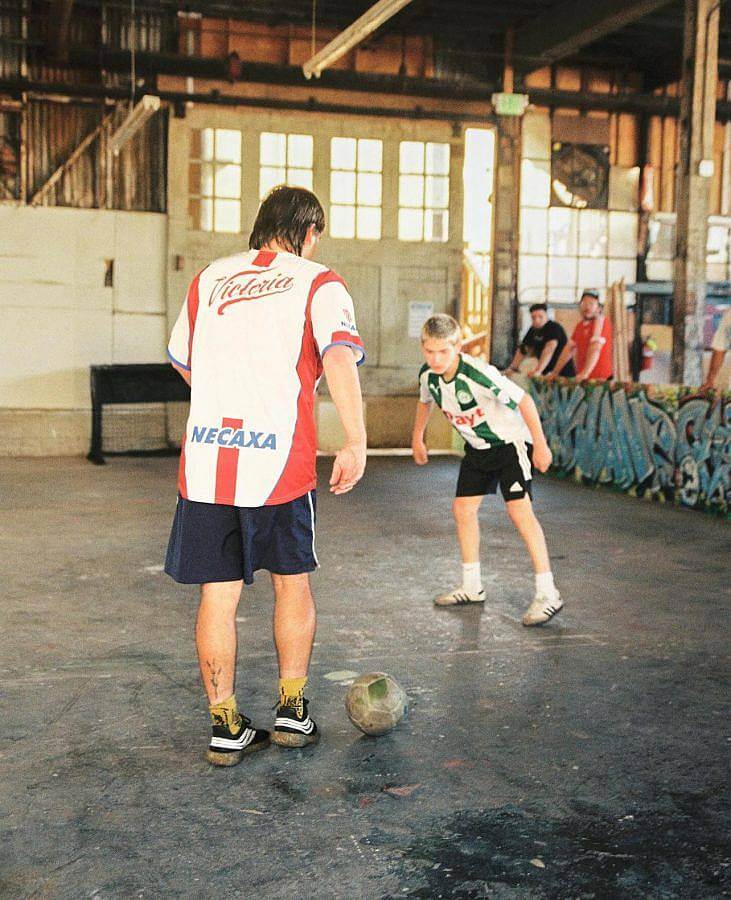
What are some of the recent, current or upcoming projects you are working on?
I’m currently working on a table design. I want to make the space more organized and useful. I love to design and build things with my hands. I’m working on making clothes for safariiiCAMP to help pay for rent, equipment and other events. I’ve wanted to do a large gallery with as much of the community as possible.
All photos taken by Adeeb unless otherwise noted.
Interviewed by Luca Lotruglio.
